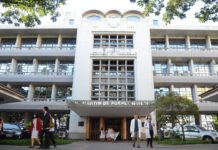THE UNIVERSITY launched its first off-campus training program which will offer a three-month certification course on audiological technology for 33 community health workers last Jan. 16 in San Fernando, Pampanga.
Dr. Norberto Martinez, chairman of the UST Department of Otorhinolaryngology said courses on aural health and technology will be given to trainees to enhance their expertise in administering hearing screening and aural tests.
“The objective is to be able to train the [health workers] so they can deal with their own community needs. We wanted to empower the community because the patients may not have the means to see a specialist for their concerns as far as ear and hearing health care is concerned,” Martinez told the Varsitarian.
Martinez said the urge to further educate community workers was due to the shortage of audiologists and ear, nose and throat (ENT) doctors in the Philippines, resulting in huge doctor to patient ratio.
“There should be one ENT [docAtor] per 25,000 people. There are only about 800 ENT doctors all over the country… More so with audiologists, there could be only as little as 30 audiologists all over the country. So you see the big discrepancy in terms of manpower in relation to the population,” Martinez said.
The program, facilitated by two faculty members from the University, convenes every Monday and Tuesday from January to March in which the trainees are given theoretical and hands-on training and will receive a certificate from UST upon completion.
The program is in partnership with the Global Starkey Foundation and funded by the local government of Pampanga.
More audiology courses to be offered off-campus
After the launch of the training program in Pampanga, local governments have started to express interest in replicating the project in their respective provinces.
“Tarlac is already interested to get the course to [their place] after Pampanga… So it seems like the course, for the meantime, will be off-campus because of the interest of the different provinces to get their nurses trained,” Martinez said.
Although the University focused on offering the course off-campus, it would also be offered in the campus as an undergraduate program.
“The basic idea is to offer that course in campus. It’s just that there is an immediate need and an immediate request by the provinvces, so we will do that… There are many developments in the field of ear and hearing care now, it’s just that we want to reach out to the community,” Martinez said.















